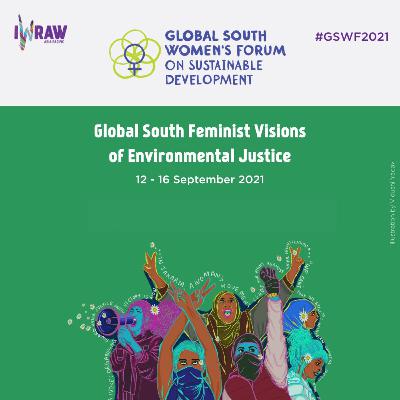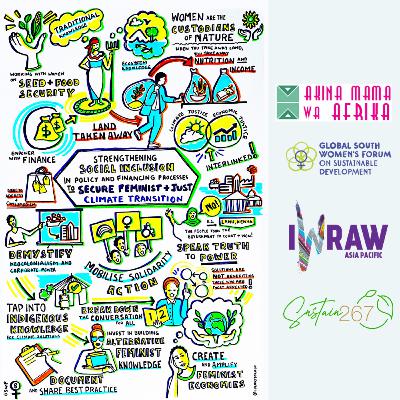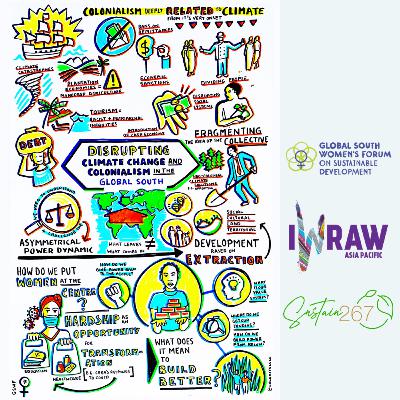Discover Sustain267 Podcast
Sustain267 Podcast

42 Episodes
Reverse
In this episode of Sustain267 Podcast, we are in conversation with climate justice and gender activist Haneen Shaheen. We discussed Egypt- post COP27, her journey within the climate justice movement as a gender and climate activist. She also shared tips for civil society in the UAE on engaging and working with their government during the countdown to COP28.
Links
Learn more about UNFCCC and SB58 here
Support the Sustain267 Podcast on Patreon here
Let's connect on Facebook, Twitter, and Instagram.
Welcome to Season 3 of the Sustain267 Podcast! In this episode, we are joined by award-winning Pan-African activist and
Head Of Building Movement Power at Climate Action Network International, Muhammed Lamin Saidy. We discuss the importance of organising for climate action as Africans, the principles that should guide climate action on the continent and the need for systems change for climate justice.
Links
Oil profits in 2023: Amnesty International, Reuters, CNBC Africa, International Energy Agency
Support Sustain267 Podcast from as little as $3.00 a month here
Let’s connect on Facebook, Twitter, Instagram, Youtube, and LinkedIn.
In this episode of Sustain267 Podcast we are joined by Nalejileji Tipap from the Pastoralist Indigenous Non-Governmental Organizations' Forum in Tanzania and Gasemotho Satau, the Chairperson of the Indigenous People’s Coordination Committee for the SADC Region in Shakawe, Botswana. We discuss their journey to and at COP26 and bring the conversation home to their lived experiences as indigenous people of Africa in the present day.
Contact details for support
Nalejileji Tipap- Pastoralist Indigenous Non-Governmental Organizations' Forum, www.pingosforum.or.tz ntipap [at] pingosforum[dot]or[dot]tz
Gasemotho Satua- Trust for Okavango Cultural and Development Initiatives (TOCaDI), gsatau[at]gmail[dot]com
Support Sustain267 Podcast from as little as $3.00 a month here
Let’s connect on Facebook, Twitter, and Instagram
This episode unpacks “The Rise of Disaster Capitalism: Climate change, COVID-19 and the Green New Deal”. The current gap in discourse between affected communities on the ground, governments, and multilateral organisations on the impacts of extreme weather events requires that national communities are visible in regional and international political and climate spaces and that their narratives are shared and voices are heard. Marginalised communities are systematically excluded from these spaces, so it is vital to promote their participation in creating, developing, implementing, and monitoring policy responses to and plans on climate change and disaster relief that support their needs. Most of these policy pronouncements do not yet directly address the issues through an inclusive and intersectional approach. Ensuring the inclusion and engagement of women, youth, and others representing marginalised communities in the conversations concerning climate policies and programs, as well as post-COVID recovery measures, is critical for protecting their rights, livelihoods, and critical ecosystems, and biological diversity.
This episode is from the 2021 Global South Women’s Forum on Sustainable Development hosted by International Women’s Rights Action Watch Asia Pacific, a feminist organisation committed to the full realisation of women’s human rights through the pursuit of equality.
Speakers: Kavita Naidu, Women and Gender Constituency (WGC), Fiji/Australia
Mela Chiponda, Women’s University in Africa, Zimbabwe
Felogene Anumo, Association for Women’s Rights and Development (AWID), Kenya
Find Lulu Kitololo on her website or on her social media pages Instagram, Twitter, and Facebook
Watch the episode with visuals here and watch all 23 sessions of the forum on the IWRAW youtube channel here
This is the final episode of this series from the 2021 Global South Women’s Forum on Sustainable Development hosted by International Women’s Rights Action Watch Asia Pacific. Over the last few years, there have been many discussions about the Green New Deal (GND), including responses and alternative formulations such as the decolonial, feminist and internationalist GNDs. This final session is a dialogue around whether the GND discussions resonate and connect to the Global South.
Speakers:
Bhumika Muchhala, Third World Network, USA/India
Priya Lukka, Goldsmiths University of London, UK
Emilia Reyes, Equidad, Mexico
Gabriela Mendes Chavez, Agrarian South Network, Brazil
Watch the episode with visuals here and watch all 23 sessions of the forum on the IWRAW youtube channel here
In this episode, the panel explores methods of “Strengthening social inclusion in policy and financing processes to secure feminist and just climate transition”. The climate crisis severely threatens vulnerable communities’ livelihoods, access to food, water, and shelter. It exacerbates existing inequalities caused by differences in gender, socioeconomic class, race, ethnicity and age, and undermines development. Despite this, these communities, which also have the fewest resources to adapt or mitigate its effects, have drawn from their lived experiences to take countless inventive steps to slow it and address its impacts. Yet, they are often not involved in policy and decision-making. The global decision-making process needs to shift to more inclusivity and centre the voices, knowledge, and skills of communities, particularly women in the Global South, and leverage on their locally shaped climate solutions for inclusive and just climate transition.
This episode is from the 2021 Global South Women’s Forum on Sustainable Development hosted by International Women’s Rights Action Watch Asia Pacific, a feminist organisation committed to the full realisation of women’s human rights through the pursuit of equality.
Click to listen to Nyamishana’s Podcast episode on “A feminist conversation on the climate crisis featuring Ruth Nyambura”
Find Lulu Kitololo on her website or on her social media pages Instagram, Twitter, and Facebook
Watch the episode with visuals here and watch all 23 sessions of the forum on the IWRAW youtube channel here
In this episode, the panellists unpack the relationship between climate change and colonialism in the Global South. Rooted in colonialism, the transatlantic slave trade, and an extractivist relationship to the natural world, conventional economic and development models have led to mass environmental destruction and continue to exacerbate the ongoing climate crisis. Likewise, the human-made consequences of climate change exacerbate economic inequalities, destroy livelihoods, infrastructure, and social safety nets, and impact the resources and strategies available for governments and the global community to provide for each other and prioritise care and well-being of people and planet as the main objective of economic policymaking. These consequences include immediate effects in the wake of extreme weather events exacerbated by climate change and long-term effects of the global rise in temperature, with a disproportionate effect on low- and middle-income countries, particularly those in warmer climates in the Global South.
Speakers:
Pambana Bassett, Solidarity Collective (Havana) & Comité en pro del Pueblo de Chiapas, Cuba
Ikal Angelei, Friends of Lake Turkana, Kenya
Find Lulu Kitololo on her website or on her social media pages Instagram, Twitter and Facebook
Watch the episode with visuals here and watch all 23 sessions of the forum on the IWRAW youtube channel here
This episode focuses on a human-rights-based approach to biodiversity and gender justice, converging around areas of synergy across various international biodiversity-related fora and national actions. It introduces and shares knowledge of Indigenous women in working collectively towards a transformative global agenda for women and girls and environmental justice.
This episode is from the 2021 Global South Women’s Forum on Sustainable Development hosted by International Women’s Rights Action Watch Asia Pacific, a feminist organisation committed to the full realisation of women’s human rights through the pursuit of equality.
Speakers: Edna Kaptoyo, PAWANKA Fund, Kenya
Kanlaya Chularattakor, Indigenous Women Network in Thailand (IWNT), Thailand
Aydah Akao, Network of Indigenous Peoples in the Solomon Islands (NIPS), Solomon Islands
Sushila Kumari Thapa Magar, FIMI, Nepal
Click to watch the Thengapalli film
Find Lulu Kitololo on her website or on her social media pages Instagram, Twitter, and Facebook
Watch the episode with visuals here and watch all 23 sessions of the forum on the IWRAW youtube channel here
This is the third of eight episodes of Sustain267 Podcast, we share with you conversations that included Africans from the 2021 Global South Women’s Forum on Sustainable Development hosted by International Women’s Rights Action Watch Asia Pacific, a feminist organisation committed to the full realisation of women’s human rights through the pursuit of equality.
This episode is from the Day 3 Creativity & Cultural Corner, Nadia Mohd Rasidi, and is in conversation with Monanja Mwenyewe, a Nairobi-based artist about his song “You’re enjoying it”. It also features art pieces from Danielle Boodoo-Fortune.
Watch Monanja Mwenyewe’s here
See Danielle Boodoo-Fortune's art on her website
Watch the episode here and watch all 23 sessions of the forum on the IWRAW youtube channel here
This is the second of eight episodes of Sustain267 Podcast, we share with you conversations that included Africans from the 2021 Global South Women’s Forum on Sustainable Development hosted by International Women’s Rights Action Watch Asia Pacific, a feminist organisation committed to the full realisation of women’s human rights through the pursuit of equality.
In this episode, WoMin African Alliance screened their award-winning film, Women Hold up the Sky. Through the eyes and experiences of women impacted by coal, oil, and mega-infrastructure projects in South Africa, Uganda, and the Democratic Republic of Congo, Women Hold Up the Sky explores stories of resistance and communities in the active struggle to take back control of their land, their rights, their bodies, and their lives. The screening was followed by a reflection on the film’s themes as well as the process of making the film, and building analytical linkages, connections, and solidarities with other communities and movements engaged in the same struggles for climate justice across Africa and around the world.
Speakers:
Salomé Elolo, Femmes Solidaires (FESO), Democratic Republic of Congo
Medical Nziba, Siyaphakama Women’s Forum/Somkhele Women’s Group, South Africa
Beatrice Rukanyanga, Kwataniza Women Farmers Group, Uganda
Click to watch the award-winning film “Women Hold Up the Sky: African Women Rise for Climate Justice”
Watch the episode here and watch all 23 sessions of the forum on the IWRAW youtube channel here
In the next eight episodes of Sustain267 Podcast, we share with you conversations that included Africans from the 2021 Global South Women’s Forum on Sustainable Development hosted by International Women’s Rights Action Watch Asia Pacific, a feminist organisation committed to the full realisation of women’s human rights through the pursuit of equality.
The first episode of the series is the “A Green Future for Us: Youth Voices in Climate Justice” panel, Youth voices, particularly those from the Global South, should be a key part of current and future discourse on climate change. This plenary session brought together young champions from different Global South regions, who are poised and passionate about the ongoing climate crisis and who have served as change agents in their homes, schools, and communities. They highlighted the opportunities and challenges as well as the impact of their work in their individual spaces.
Speakers:
Ayesha Constable, Young People for Action on Climate Change (YPACC), Jamaica
Dumiso Gatsha, Success Capital, Botswana
Renata Koch Alvarenga, EmpoderaClima, Brazil
Belyndar Oiaka Rikimani, Pacific Islands Climate Action Network (PICAN), Solomon Islands
Find Lulu Kitololo on her website or on her social media pages Instagram, Twitter and Facebook
Watch the episode here and watch all 23 sessions of the forum on the IWRAW youtube channel here
For this episode, we partnered with the British High Commission in Botswana to bring you a conversation on “Botswana's Journey Post-COP". Joined by Her Excellency Sian Price- British High Commissioner to Botswana, Dr. David Lesolle- Climatologist and Lecturer at the University of Botswana, Gasemotho Satau- Chairman of the Indigenous People of Africa Committee for SADC and COP26 Delegate and Mpho Tshwaane, 16th UN Climate Change Conference of Youth, Botswana Delegate we reflect on the recently ended COP26 in Glasgow.
Learn More about COP26 here
Read Botswana’s 2015 NDCs here
Support Sustain267 from as little as $3.00 a month here
Let’s connect on Facebook, Twitter, and Instagram
For this episode, we partnered with the British High Commission in Botswana to bring you a conversation on “Botswana Road to COP26”. Joined by Tremayne Stanton-Kennedy, Resilience and Green Growth Adviser / Regional Climate Lead for Southern Africa at the UK-FDCO, Mrs. Baitshepi Babusi- Hill, Deputy Permanent Secretary at the Ministry of Environment Natural Resources Conservation and Tourism and Dr. David Lesolle- Climatologist and Lecturer at the University of Botswana we unpack what Botswana's ambitions are at COP26 in Glasgow.
Learn More about COP26 here
Read Botswana’s 2015 NDCs here
Resources from the Ministry of Environment Natural Resource Conservation and Tourism
Botswana Climate Change Policy 2021
Botswana Climate Action Plan 2018
Botswana Climate Change Strategy 2019
Support Sustain267 from as little as $3.00 a month here
Let’s connect on Facebook, Twitter, and Instagram
In this episode, joined by Gugu Nonjinge, we discuss intersectional environmentalism within the African context- what it means and how we may use it to create more inclusive climate solutions for Africa.
We also meet an intersectional environmentalist living in Botswana, Tinaye Mabara.
Notes
Paper: “Demarginalizing the Intersection of Race and Sex” by Kimberlé Crenshaw
Ted Talk: The Urgency of Intersectionality
Policy Paper by Afrobarometer: Change ahead Experience and awareness of climate change in Africa
African Union Transitional Justice Policy
Also worth reading:
https://www.thegoodtrade.com/features/practicing-intersectional-environmental-justice
https://medium.com/climate-conscious/intersectional-environmentalism-a-crash-course-6a0c495ace91
Support Sustain267 from as little as $3.00 a month here
Let’s connect on Facebook, Twitter, and Instagram
In this episode of the Sustain267 Podcast, we unpack the recently released IPCC Sixth Assessment Report by Working Group 1 on the physical science basis of climate change. We explore the significance of the report for Africa, the low representation of African scientists and how to use the report for climate action and climate solutions
Links
IPCC AR6 Working Group 1 - Full Report
IPCC AR6 Working Group 1 - Summary for Policymakers
List of climate scientists who contributed to the report
Sustain267 Podcast- Political Will
Kyoto Protocol
Paris Agreement
IPCC opportunities
Support Sustain267 from as little as $3.00 a month here
Let’s connect on Facebook, Twitter, and Instagram
In this episode of the Sustain267 Podcast, we explore what climate resilience is and what role it plays in growing African countries with Dr Mzime Ndebele-Murisa. We explore the complexities of building climate change resilient African cities, the best-practice methods and highlight the leading African countries on climate change resilience. This conversation is guided by Dr Murisa’s paper "City to city learning and knowledge exchange for climate resilience in southern Africa”. This episode is part of the ICLEI Africa and the African Centre for Cities, RISE Africa’s discussion series. This series is supported by the South African National Research Foundation, you may find more thought pieces on the Rise Africa Platform
Dr. Murisa’s Professional pages:
1. Google scholar: http://scholar.google.com/citations?user=PFxBl1YAAAAJ&hl=en
2. LinkedIn: https://zw.linkedin.com/in/mzime-murisa-57142b15
3. ResearchGate: https://www.researchgate.net/profile/Mzime-Ndebele-Murisa
Notes:
New York floods
Durban floods in 2019
Projects mentioned by Dr. Murisa:
FRACTAL: www.fractal.org.za and https://start.org/prosus3 (magazine special issue) and https://start.org/startcast/season-2 (podcast series focusing on FRACTAL)
EPIC: www.epic.org
SIVIO Institute Residents Associations inter-city virtual tours for knowledge exchange: https://www.youtube.com/watch?v=-oD2GGPvvgA&list=PLLfoFtOQC_mOU6nl5SMTZlFuBfvWrh_e9
In the episode of Sustain267 Podcast, joined by Tasneem Essop the Executive Director of Climate Action Network International (CAN-I), we unpack the G7 summit. What is it and how its decisions and resolutions affect Africa. We take an in-depth look at some of its commitments and what they will mean for climate action and sustainable development in Africa.
Click for more on:
G7 Summit
Carbis Bay G7 Summit Communique
#SaveTheOkavangoDelta
East African Pipeline
Coal Development in Mozambique
Click here to become a Patron and support the production of the Sustain267 Podcast
Connect with us on Twitter, Facebook, and Instagram
In this episode, we are in conversation with the former President of the National Assembly of the Democratic Republic of the Congo, current Member of Parliament for Bumba, DRC, and the founder of Lux Africa, a solar power initiative to expand access to renewable energy Hon. Janine Mabunda. We unpack her article Congo-Kinshasa: DRC Holds Key to Addressing the Global Climate Crisis.
Click to read more on:
Dr. Mkwege, Nobel Peace Prize Laureate
Community management of mineral resources: the case of the Royal Bafokeng Nation
Kimberly Process
Broad-Based Black Economic Empowerment (B-BBEE)
Click here to become a Patron and support the production of the Sustain267 Podcast
Connect with us on Twitter, Facebook, and Instagram
In this Africa Day 2021 episode of Sustain267 podcast we bring the “SameStormDifferentBoats; Telling the African climate crisis story” conversation, hosted by the Wangari Maathai Foundation in commemoration of the late Wangari Maathai’s birthday.
Youth climate activism has continued to raise the consciousness of the urgency with which public and political action on the climate crisis is required. The continent of Africa bears the brunt of the impact of the climate crisis and young Africans are at the frontline of climate action, however, they are not seen on the front page (and sometimes even deleted from the front page), nor are their voices heard during the debates on climate change.
What will it take to get their voices to the table? What do they offer to the conversations? and what are they optimistic about?
The WMF Chairperson, Wanjira Mathai, hosted this conversation with Greta Thunberg, Elizabeth Wathuti a young climate activist from Kenya, Vanessa Nakate a young climate activist from Uganda, Olumide Idowu a climate activist from Nigeria and Professor Youba Sokona, a climate scientist from Africa.
Click here for more about The Wangari Maathai Foundation
Learn about and follow the speakers here:
Wanjira Mathai: Twitter
Elizabeth Wathuti: Twitter & Instagram
Vanessa Nakate: Twitter & Instagram
Olumide Idowu: Twitter & Facebook
Prof. Youba Sokona
Watch the webinar on Youtube here
Click here to become a Patron and support the production of Sustain267 Podcast
Follow us on Twitter & Instagram and like the Sustain267 Facebook Page to continue the conversation
After nearly two years off buying clothes, the host of Sustain256 Podcast is making her way back to fashion. To kick off this journey we reached out to Masego, a slow fashion advocate and co-creator of cnscs_. We touch on conscience fashion, ethical shopping, and how and where to find accurate conscience fashion information. Get in touch with Masego: Instagram: @coconut_cracked Blog: Cnscs Instagram Accounts to follow: GiveCredit Aja Barber Dominique Drakeford Celine Semaan founder of The Slow Factory The article that put me off fashion The true cost of fashion Documentary Resources https://www.weforum.org/agenda/2020/01/fashion-industry-carbon-unsustainable-environment-pollution/ https://www.businessinsider.com/fast-fashion-environmental-impact-pollution-emissions-waste-water-2019-10 https://www.ellenmacarthurfoundation.org/assets/downloads/publications/A-New-Textiles-Economy_Summary-of-Findings_Updated_1-12-17.pdf
















Solution: decolonization of education curricula is key!!
S/O to the Prof for highlighting the lack of enviro experts in the covid19 task force. Yes,preservation of human life is the priority but those efforts become almost redundant if we treat people as if they are not part of the ecosystem.
but great conversation, informative! I didnt even know about Hemp*
I feel we tend not to see and give much credit to what we already have. Yes! to new stuff but lets also appreciate what is already there. We must develop, expand and improve what we have e.g. Nortex is a factory that i feel is overdue of being diversified and being given the credit it has actually held this country down.